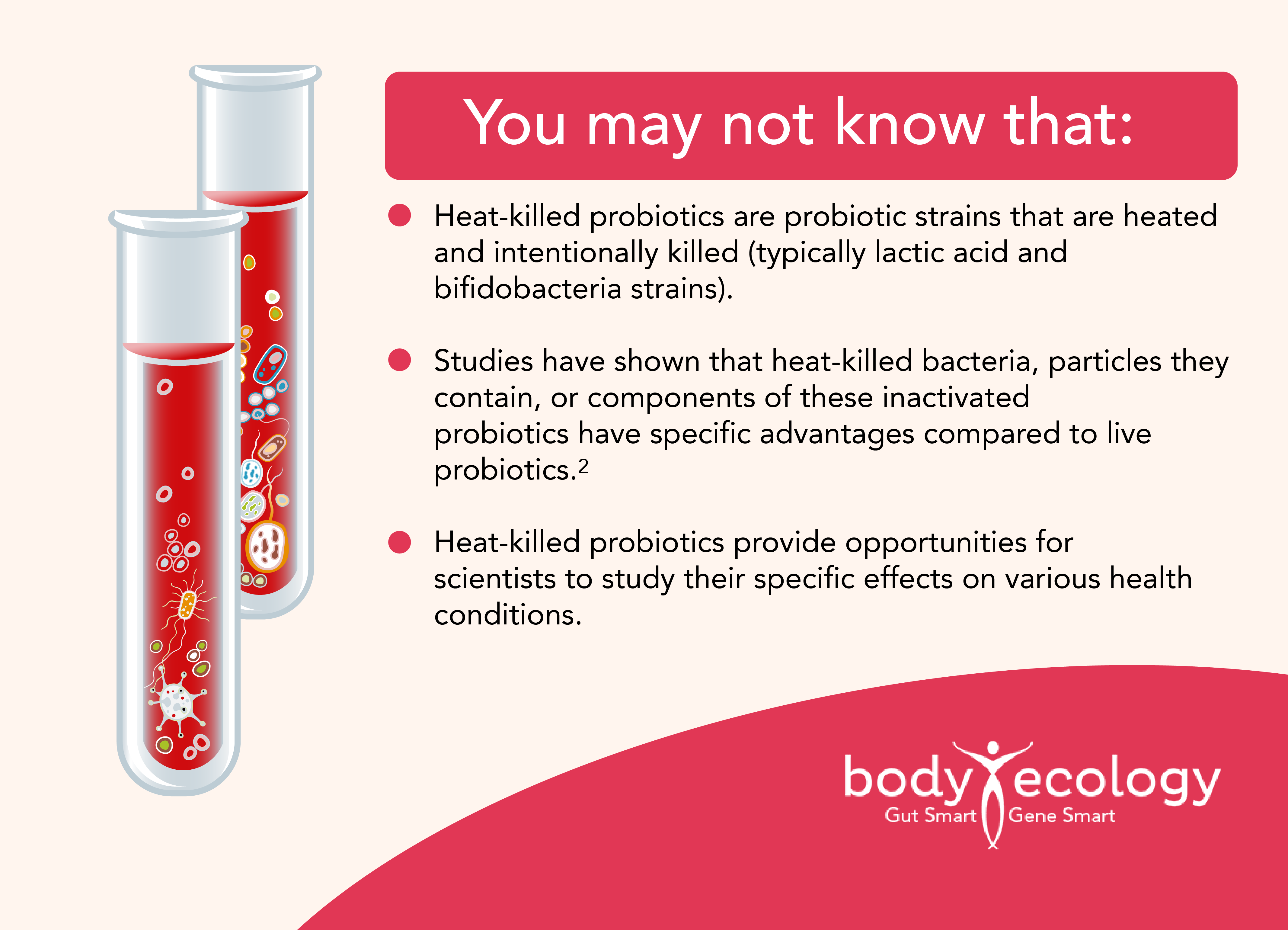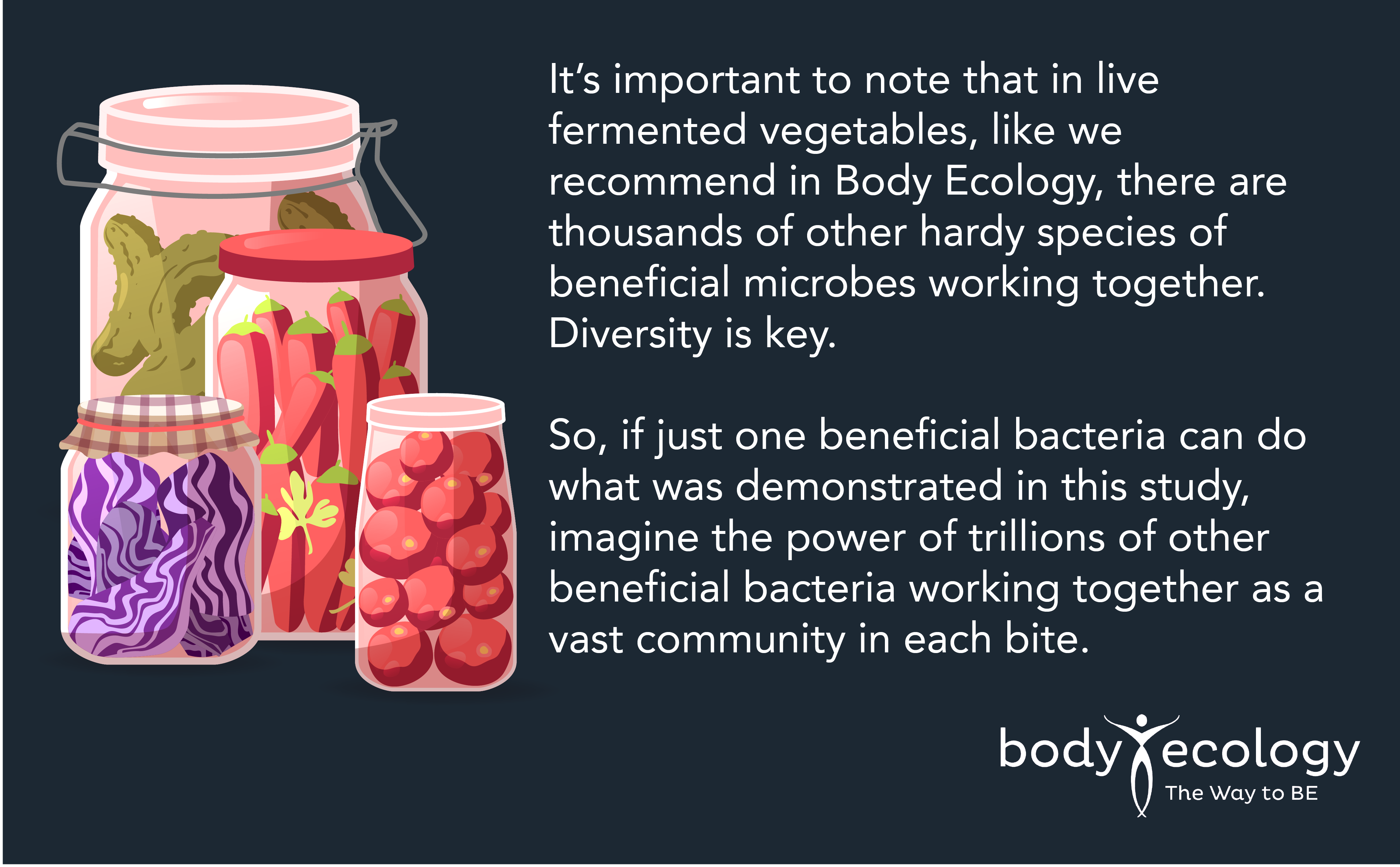When and if you vaccinate, this is important to know! from Body Ecology on Vimeo.
Study shows fermented vegetables enhance effectiveness of vaccines
In August of 2020, an important study (especially from Body Ecology’s point of view) was released.1 It examined the adjuvant effects of killed Lactobacillus casei probiotics on T-helper type 1 immune responses and their effect on the efficacy of influenza vaccinations.
What does this mean exactly?
Adjuvant, a term used in pharmacology, is an additional drug, other ingredient, or a combination of ingredients that can increase the effectiveness or potency of another drug.
With this study, Lactobacillus casei DK128 bacteria was used as an adjuvant, or added substance, to influenza (flu) vaccines to study how these heat-killed bacteria might affect the vaccines when paired together. (They weren’t even alive, but imagine if they were.)
What are heat-killed probiotics, and what are their benefits?

Heat-killed probiotics can help modulate the immune system and protect against enteropathogens (pathogens that tend to attack the intestinal system), as well as help to maintain a healthy intestinal barrier.3 Heat-killed probiotics may also be beneficial in dermatological or respiratory-related allergic conditions.4,5
Ready to start your journey to better health? Our Body Ecology Quickstart Guide can help.
Beneficial lactic acid bacteria can make a vaccine more potent
Getting back to the 2020 study: Researchers used lactic acid bacteria (Lactobacillus casei DK128), isolated from fermented vegetables, to stimulate the natural immune response in mice. They were able to demonstrate that fermented vegetables activated the immune response — thereby enhancing the effectiveness of the flu vaccination.
Here’s how the study was conducted:
- Scientists immunized mice with a split influenza virus vaccine.
- A split virus vaccine is a noninfectious vaccine that contains immunity-producing viral proteins that have been separated from whole virus particles and purified by other inactive components.
- This minimizes the risk of any possible adverse reactions or possible infection from the vaccine virus itself.
The scientists then isolated just one type of Lactobacillus — casei — found in fermented vegetables and combined it with the vaccine. This resulted in significantly higher levels of both IgG1 and IgG2c antibodies being produced versus what was produced by the vaccine alone.
What they observed was that just a single dose of the vaccine/probiotic combination produced a protective effect, particularly on the lungs. This protection included intact lung function, as well as clearance of lung viral loads.
Also observed were lower levels of inflammatory cytokines (signaling molecules secreted from immune cells, such as helper T cells, like those studied here that promote inflammation). This would indicate that a potential cytokine “storm,” as is often associated with COVID-19 infections, would be unlikely.
Researchers also found that when mice were immunized with the combination treatment, and not simply the vaccine alone, those who were immunocompromised were better protected from serious disease. Therefore, this treatment benefited both immune-competent and immunocompromised mice.

Unsure if you’re getting enough good bacteria in your diet? Body Ecology has powerful probiotic blends to supplement your diet, providing plenty of robust, beneficial microbes to enhance gut health each day.
If you choose to vaccinate or must vaccinate, then please be sure you and your family are eating these important gut- and immune-enhancing foods with each full meal.
REFERENCES:
- 1. Jung YJ, Kim KH, Ko EJ, Lee Y, Kim MC, Lee YT, Kim CH, Jeeva S, Park BR, Kang SM. Adjuvant effects of killed Lactobacillus casei DK128 on enhancing T helper type 1 immune responses and the efficacy of influenza vaccination in normal and CD4-deficient mice. Vaccine. 2020 Aug 10;38(36):5783-5792. doi: 10.1016/j.vaccine.2020.06.075. Epub 2020 Jul 13. PMID: 32674907; PMCID: PMC7453881.
- 2. Piqué N, Berlanga M, Miñana-Galbis D. Health Benefits of Heat-Killed (Tyndallized) Probiotics: An Overview. Int J Mol Sci. 2019 May 23;20(10):2534. doi: 10.3390/ijms20102534. PMID: 31126033; PMCID: PMC6566317.
- 3. Nicholas Talley, M.D., Ph.D., professor, School of Health and Medicine, University of Newcastle, Newcastle, New South Wales, Australia; Elena Ivanina, D.O., gastroenterologist, Lenox Hill Hospital, New York City; April 8, 2020, The Lancet Gastroenterology & Hepatology, online.
- 4. Santoro, D., Fagman, L., Zhang, Y. and Fahong, Y. (2021), Clinical efficacy of spray-based heat-treated lactobacilli in canine atopic dermatitis: a preliminary, open-label, uncontrolled study. Vet Dermatol, 32: 114-e23. https://doi.org/10.1111/vde.12915.
- 5. Hirose Y, Yamamoto Y, Yoshikai Y, Murosaki S. Oral intake of heat-killed Lactobacillus plantarum L-137 decreases the incidence of upper respiratory tract infection in healthy subjects with high levels of psychological stress. J Nutr Sci. 2013;2:e39. Published 2013 Dec 6. doi:10.1017/jns.2013.35.










